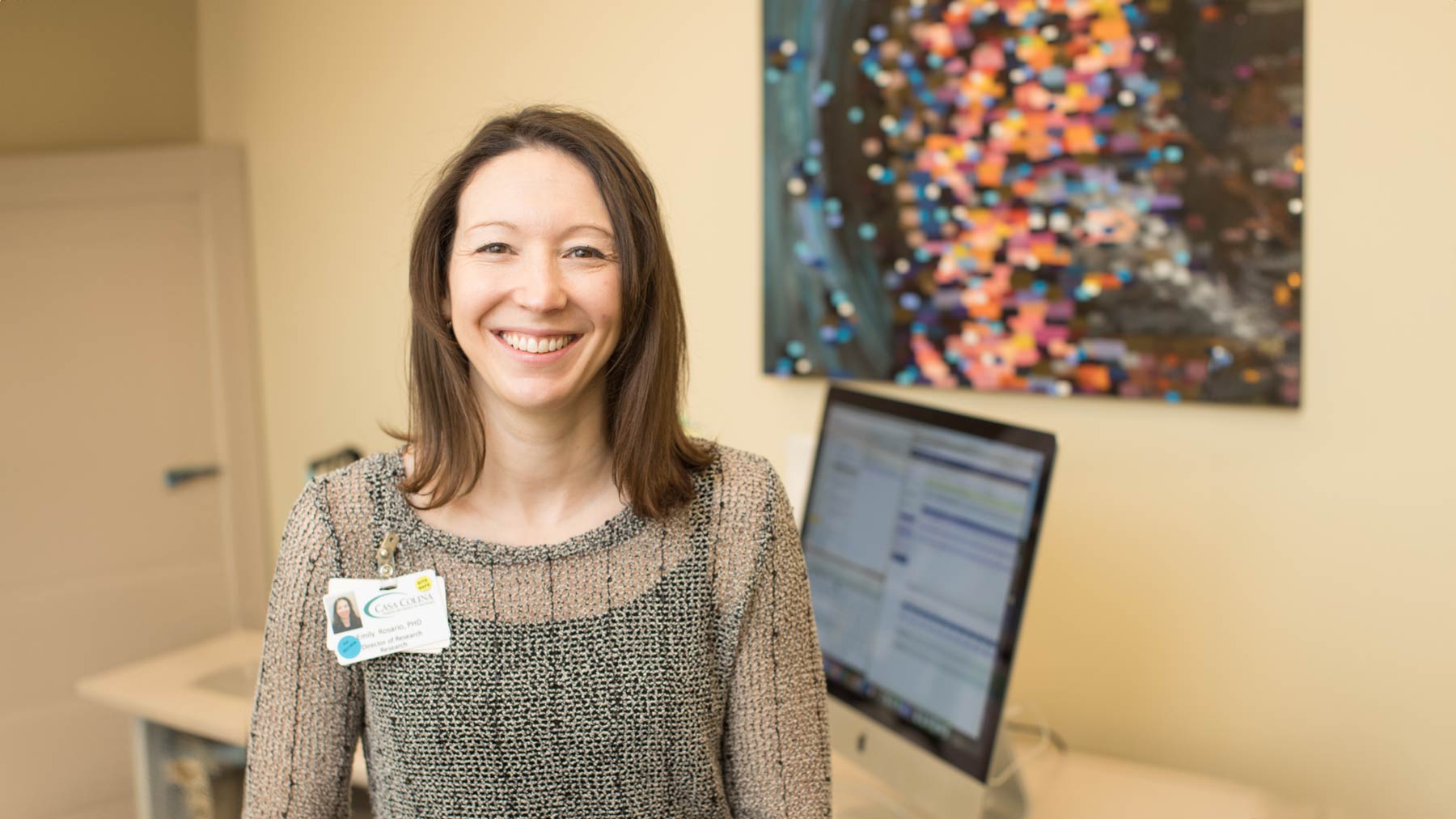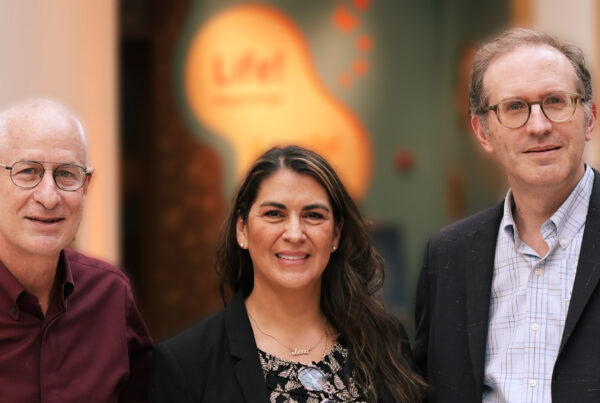Emily Rosario, a USC PhD in neuroscience graduate, directs the Research Institute at Casa Colina Hospital and Centers for Healthcare. She leads clinical trials that could benefit people who have suffered strokes or have diseases such as Alzheimer’s and Parkinson’s.
Rosario joined the Casa Colina rehab hospital in 2012, after completing her PhD and a postdoc at the Leonard Davis School of Gerontology. At the time, the CEO was starting a research program and offered Rosario the director position.
“I always saw myself pursuing an academic career but this was a chance to build something,” Rosario says. “Twelve years ago, it was just me. Now I have a team of 10 and am running over a dozen research studies.”
Extending expertise gained at USC Leonard Davis School to clinical research in neurologic rehabilitation
Rosario has structured the Casa Colina Research Institute like the academic lab she did her PhD research in at USC Leonard Davis School. She actively secures grant funding and publishes her work. “My program is about two-thirds grant-funded,” she says. “The remaining support comes from the hospital foundation.”
Casa Colina provides a broad range of medical services but is renowned for their expertise in neurologic rehabilitation. Rosario’s research focuses mainly on stroke, traumatic brain injury and spinal cord injury. She also studies other neurologic conditions and movement disorders, such as Alzheimer’s disease and Parkinson’s disease.
The goal of the Research Institute is to evaluate novel therapeutic interventions through clinical trials. Project ideas come from the research team, clinicians at Casa Colina and external partners. Examples of Rosario’s recent clinical trials include:
Assessing transcranial direct current stimulation (tDCS) in patients with stroke
Rosario just completed an internal study investigating tDCS in patients who were at least six months post-stroke and have trouble communicating, a condition called aphasia.
This study used a double-blind design, meaning neither the patients nor the researchers know who is receiving which type of treatment.
Patients came to the Research Institute to receive tDCS paired with speech therapy or placebo stimulation with speech therapy. Researchers performed language assessments to measure changes in communication. The intervention lasted one week and the researchers followed each patient for several months afterward.
The study showed a significant benefit with tDCS and therapy. Casa Colina has now implemented this treatment for patients with stroke and aphasia. “Investigating new treatments and seeing them incorporated into clinical care is exciting and rewarding,” says Rosario.
Collaborating across institutions to study stroke and other neurologic conditions
Rosario collaborates with researchers across Los Angeles and the U.S, including her colleagues from USC. Current partners and studies include:
- USC Division of Biokinesiology and Physical Therapy: This study investigates whether physical therapy improves arm movement in people with post-stroke weakness on one side of the body. The intervention includes six weeks of physical therapy sessions that involve rapid repetitive arm movements.
- UCLA: This study looks at whether low-intensity focused ultrasound pulsation (LIFUP) therapy improves consciousness after severe brain injury. Eligible participants include people who have a diagnosis of vegetative or minimally conscious state.
- University of Michigan: This multi-center randomized controlled trial evaluates whether treating patients for sleep apnea immediately after stroke improves their outcomes.
“USC prepared me for what I’m doing now”
Rosario developed skills at USC Leonard Davis School that have helped her become successful in her current position. “From writing grants and publishing papers to collaborating across disciplines, USC prepared me for what I’m doing now,” Rosario says.
Some of her most formative experiences include:
T32 training grant
The USC Leonard Davis School awards T32 training grants to support PhD student research. The program also brings awardees together for weekly seminars to learn from experts in the field. Some weeks, the students share and discuss their own research.
Rosario received a T32 training grant for several years. She credits the program with opening her eyes to the multidisciplinary study of aging. “My lab work involved mainly bench science,” she says. “Seeing all the different aspects of gerontology widened my perspective.”
PhD dissertation in hormones and Alzheimer’s Disease
Rosario worked in the lab of Professor Christian Pike. She studied the role of sex steroid hormones in normal aging and Alzheimer’s Disease. Her work included lab studies using mice, rats and human cadaver tissue. One important finding was a link between the age-related decrease in testosterone in men and an increased risk for Alzheimer’s disease. Rosario and Pike published one of the first papers on this topic.
Rosario also appreciated the deeply collaborative environment at USC Leonard Davis School. She met professors and students with diverse interests and worked in a variety of labs, sharing knowledge, equipment and resources. “That’s something I still do,” she says. “Nobody can know everything. Partnering helps us answer important questions without being limited by our own skill sets.”
Postdoc exploring diabetes and Alzheimer’s disease
After earning her PhD in 2007, Rosario accepted a postdoc position at UCLA. She studied the overlap between diabetes and Alzheimer’s disease. But after about a year, her family moved south of Los Angeles, making the commute difficult.
So, Rosario returned to Pike’s lab. “I was able to bring this new direction of research to USC,” Rosario says. “I combined the hormone-based work I did for my PhD with studies of how diabetes increases Alzheimer’s disease risk.”
Rosario worked with Pike for nearly seven years. “Pike gave me all the tools I needed to succeed,” Rosario says. “Working with him was very formative for me.”
Finding a home and career
Before coming to USC, Rosario had completed her master’s degree at Eastern Illinois University. “When I came to the USC Leonard Davis School to interview, I was impressed with the faculty and research,” Rosario says. “I knew from the first visit there was something special here — and that ended up being true.”
Rosario didn’t intend to stay in Los Angeles. But she found a home and career here. That started with USC.
To learn more about PhD programs at the USC Davis School of Gerontology, call us at (213) 740-5156.





